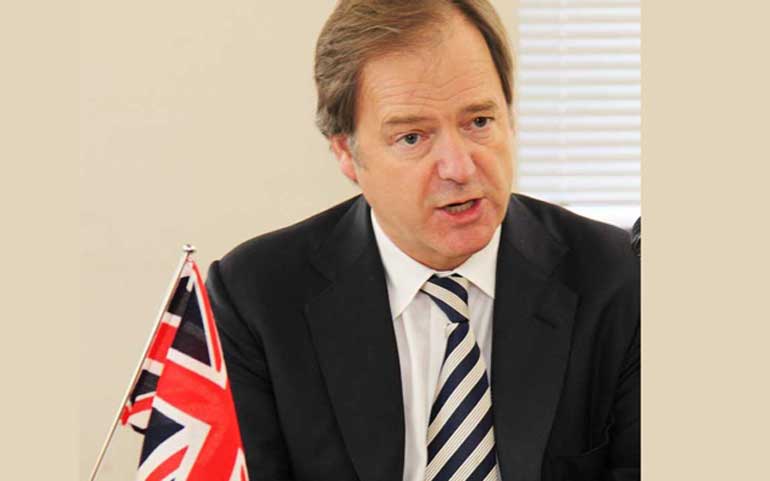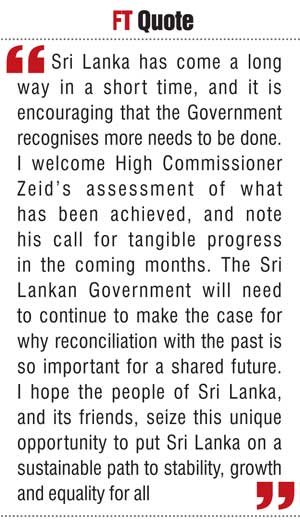Friday Feb 20, 2026
Friday Feb 20, 2026
Friday, 1 July 2016 00:00 - - {{hitsCtrl.values.hits}}


By Hugo Swire
Sri Lanka has come a long way since President Sirisena’s election in January 2015. I have been struck by the progress made. No one should underestimate the challenge of dealing with the legacy of a 30 year conflict. Sri Lanka is in a far better place now than even the most optimistic could have imagined, only 18 months ago. Yet much remains to be done.
It is encouraging that, in a marked change of approach to that of its predecessor, Sri Lanka’s Government has begun to work with the international community, rather than against it. This was shown most clearly last October, when Sri Lanka co-sponsored an historic resolution at the UN Human Rights Council.
In that resolution, the Government agreed to promote reconciliation, accountability and human rights. It accepted many of the recommendations made by the Office of the High Commissioner for Human Rights. It committed itself to a comprehensive approach to deal with the past, and to restore confidence in the institutions of the State.
The UK welcomed this. We have encouraged the Government to stay the course and to implement fully its UN commitments. We have supported it through targeted UK funding.
The UN High Commissioner for Human Rights, Prince Zeid Ra’ed El Hussein, recently delivered his first report of progress to the UN Human Rights Council. I agree strongly with his assessment. Sri Lanka has taken some encouraging steps towards implementing some of its commitments.
There have been significant steps on the return of some military-occupied land to civilians. There is an improved human rights environment. The Sri Lankan Government has instituted a constitutional reform process which will consider the devolution of political authority. It has tabled a Bill to establish an Office for Missing Persons, and set up bodies to design and consult on a wider framework for truth and justice.
The Sri Lankan Government’s renewed engagement with the UN means that Sri Lanka now has access to international expertise. The recent visits by UN Special Rapporteurs on Torture and on the Independence of Judges, together with NGO reports, have highlighted areas of concern. Shortcomings must be addressed, but it is encouraging that the government is willing to engage and has committed to act.
The High Commissioner also set out very clearly the need for a comprehensive strategy to help coordinate, integrate and sequence future progress. This needs to be supported by a concerted public information campaign, public consultations and, a respected and closely engaged National Human Rights Commission.
As a friend of Sri Lanka, it is important that the UK is prepared to discuss these difficult issues.
More land returns will be essential, both as a confidence-building measure and to allow for resettlement. This needs to be accompanied by adequate housing and support for resettled communities. The UK will continue its support for demining and for housing and resettlement through our contributions to multilateral agencies.
We will also continue to encourage the government of Sri Lanka to prioritise the repeal of the Prevention of Terrorism Act and to reform the security sector. It must address all reports of sexual and gender-based violence and torture.
Constitutional reform that delivers on the commitment to devolve political authority will be crucial for Sri Lanka’s long-term governance and prosperity. This will require courageous and determined political leadership.
We hope the Sri Lankan Government will continue to engage with the UN and that the Office of Missing Persons will soon be established. It must develop credible processes for truth, justice and reparation, based on consultations with victims and their families, in Sri Lanka and the diaspora. Witnesses need to be protected. The UK will provide support where we can.
Sri Lanka has come a long way in a short time, and it is encouraging that the Government recognises more needs to be done. I welcome High Commissioner Zeid’s assessment of what has been achieved, and note his call for tangible progress in the coming months.
The Sri Lankan Government will need to continue to make the case for why reconciliation with the past is so important for a shared future. I hope the people of Sri Lanka, and its friends, seize this unique opportunity to put Sri Lanka on a sustainable path to stability, growth and equality for all.
(Hugo Swire, MP, is the UK’s Foreign and Commonwealth Office Minister for Asia.)